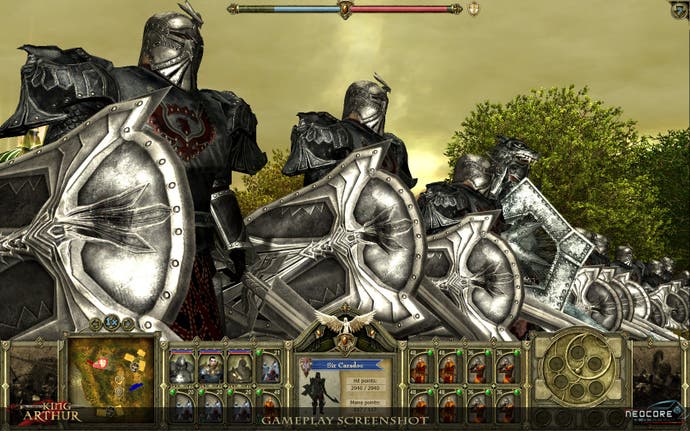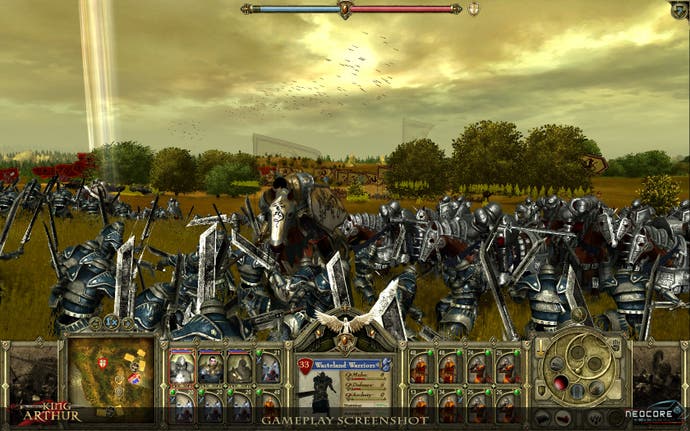King Arthur: The Role-Playing Wargame
Round table discussion.
Your growing ranks of hero units - Knights of the Round Table - can be attached to a squad, offering the usual range of buffs, attacks and debuffs. And because Neocore is at pains to tell you that this is a role-playing wargame, everything levels up, giving you a single point to spend on a limited range of stats for your units (melee, defence, archery, cost), and a slightly more comprehensive clutch of numbers and abilities for your knights.
It's not immediately apparent what these knights' numbers mean during the early game, so you'll get more immediately visible rewards spending them on battlefield skills. Save the long game for the second playthrough, otherwise you'll be paralysed by indecision.
Owning more of these Victory Points than your opponent drains their morale - as sure and deadly as running them through with ghostly spears. So it becomes an immediate priority not to position yourself on the land, but to split up and dart for the nearest Victory Point. Cavalry is essential for a headstart, and the asymmetrical maps feel, by their very nature, loaded towards one team. It's rarely you. A sound idea in theory, but in practice it's actually quite distracting.
The role-playing aspect of King Arthur is shown on your Morality chart. In the y-axis, your slow progress towards Tyranny or Righteousness is charted. Horizontally, your dedication to the Old Majickal Relijun, or the well-spelled fad of Christianity. Your first such decision comes in Dumnonia: do you help the defending and righteous king Mark, or the expanding, murderous King Idres? You decide with your actions, not by clicking on buttons marked Accept.

There's no judgment from the game, naturally - but you'd be well-advised to choose your path early and stick to it. This isn't Mass Effect, where Paragon and Renegade powers are reassuringly independent. Gain one Tyrant point and you've lost one Righteous point. Abilities and units are unlocked by your position on the map, so going one step in the wrong direction is yet another cause for a reload. It's less of a role-playing game, really, and more of an early decision reinforcement engine.
You can squirrel yourself closer to the powerful rim of the morality grid during King Arthur's unexpected text adventure sections. These simplistic but involving conversation trees follow the savage law of the playground - if you're nice, people will take your food and money. However, the teachers will like you, and the troops you pick up will have better morale.
It's not all number-tweaking, though - in the adventure that happens before the battle for Excalibur, exploring all the options will earn you an advantageous position on the map. It's your first but certainly not your last tough battle - you'll need every advantage you can claw.

There's a fundamentally old-school feeling of exploration and reward in King Arthur. You're not exploring the game's locations, so much as the quirks of the gameplay. You're constantly second-guessing (and consequently, reloading) your strategic decisions, not your role-playing choices.
I'm certainly not saying that's a bad thing, but it's such a matter of taste that handing out a score feels somehow unfair. This is an exciting, genuine and unmodern way to play a game. Testing out the corners, repeating yourself, and having your expectations undermined by unpredictable quirks is an aspect of gaming that some people will love: it's also one of the things that our era of focus groups and playtesting has surgically removed. King Arthur isn't always intuitive, but in a game with a prominent pause button, that's not necessarily a problem.
Arthurian Legend holds no undue respect for reality - no-one's sure, really, if Arthur even existed. But it's a pleasure to play a game that takes that mythology so seriously, and builds stories into it. It's a game that belongs to a different decade, a more thoughtful decade where we're not being asked to shout and mime at our televisions.
It's complicated, often unhelpful, and engrossing. It's the shy boy your mum told you to make friends with. It's a troubled and stubborn creature, with a funny run. Even the most dedicated King Arthur fan has to acknowledge the faults, and probably love the game all the more for them. For many strategy gamers, this will be the most uplifting, absorbing, and occasionally baffling seven out of ten ever.








